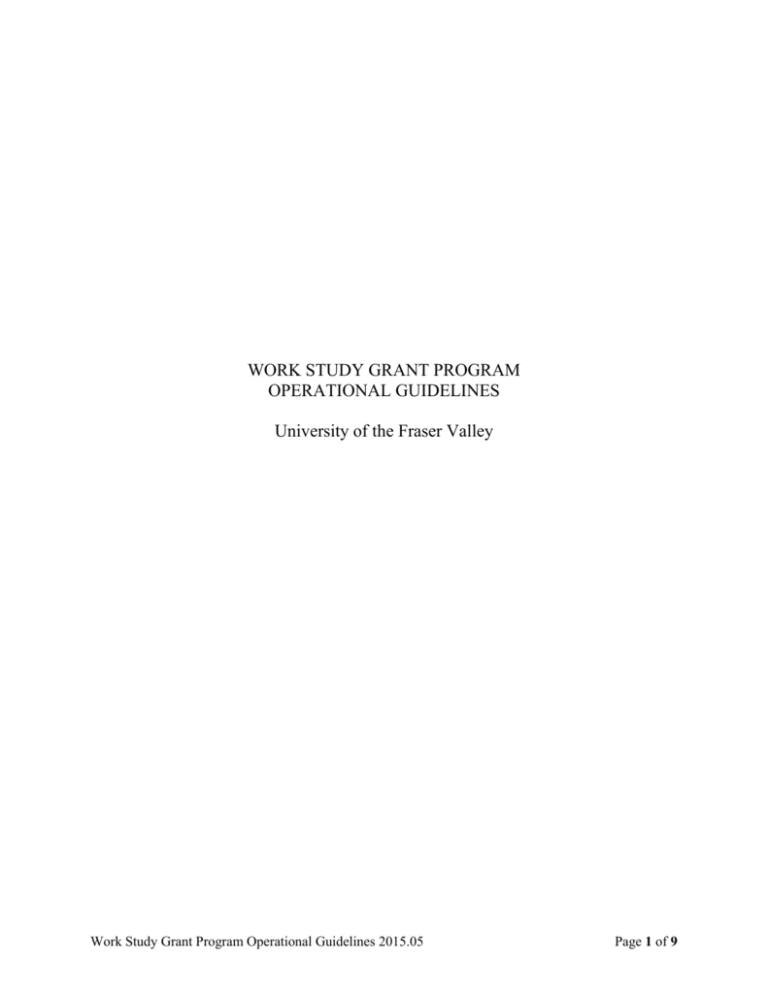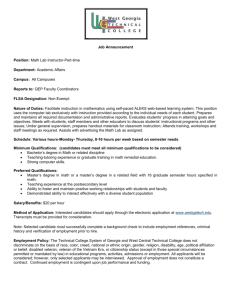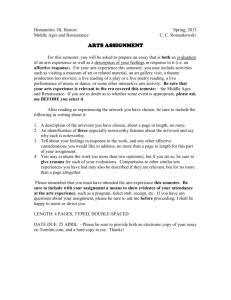WORK STUDY GRANT PROGRAM OPERATIONAL GUIDELINES
advertisement

WORK STUDY GRANT PROGRAM OPERATIONAL GUIDELINES University of the Fraser Valley Work Study Grant Program Operational Guidelines 2015.05 Page 1 of 9 1: GENERAL 1.1: DISCLAIMER These guidelines were developed in 2011/2012 with four goals in mind: 1. 2. 3. 4. Simplification of administrative processes Transparency of decision processes and funding allocation Fairness in distribution: Merit-based across functions, faculties, departments, and campuses Accountability for fund usage Attempts were made to keep these guidelines concise and consistent; guidelines will always be incomplete. Exceptions to these guidelines require exceptional circumstances and proof thereof; reason and reasonableness shall prevail. 1.2: PURPOSE OF THE WORK STUDY PROGRAM The purpose of the Work Study Grant Program is to supply full-time students with part-time job opportunities at the University of the Fraser Valley. Job opportunities funded through the program must either contain a significant educational component, ideally related to a student's field of study, or provide a service that is most effective when rendered by a student and directly to other students. 1.3: FUNDING SOURCES AND ADMINISTRATION The Work Study Grant Program is an internally funded program with a budget currently set at $316,000 per year. Funding comprises $263,000 in wage costs plus a 20.00% institutional levy covering WorkSafeBC fees, Employment Insurance premiums, and Canada Pension Plan contributions. Funding follows a funding cycle from May to April, with the corresponding semesters Summer, Fall, and Winter, and allows for 194 positions per year. The program is administered by the Career Centre. 1.4: THE STANDARD GRANT SIZE The standard grant size is 120 hours for one semester (Summer, Fall, or Winter). It may be freely distributed to one student over any one semester (e.g. 4 weeks of 30 hours each, 12 weeks at 10 hours each) as long as work time does NOT exceed 8 hours per day, 40 hours per week, and 120 hours per semester. The splitting of a standard grant amongst several students simultaneous in time is not permitted. The exception to this rule is Work Study Grant Program-funded work for that DEMONSTRABLY requires: 1. Completion within a short period of time (e.g. field data collection, event organization) 2. Independent proof (e.g. investigations into sampler bias) 3. Additional personnel for safety reasons The splitting of a standard grant amongst several students sequential in time is limited to two students. Work Study Grants may only be used to cover labour costs. Students employed under a Work Study Grant must not work on statutory holidays. Overtime hours, travel, or other expenses must be covered by another funding source. Work Study Grant Program Operational Guidelines 2015.05 Page 2 of 9 1.5: WAGES AND POSITIONS Work Study Grant Program wages are uniform at the minimum wage level regardless of the work being performed by the student. Hourly wage for a Work Study Grant student = Provincial minimum wage of $10.25 + 6% vacation pay + 4% in lieu of benefits Hourly wage cost = Hourly wage + 20% institutional levy Total cost for a 120-hour position Number of 120-hour positions fundable by a Work Study Grant Program budget of $316,000 $11.28 $13.53 $1623.60 194 For competitions from 2014/2015 to 2019/2020 funding is available for an additional 20 positions per year, bringing the total number of 120-hour positions per year to 214. 1.6: ALLOCATION OF POSITIONS Allocations are divided into three functional pools: Research, Service, and Teaching. Applicants are required to declare the functional pool of their work and will compete for positions against applicants of the same pool. If a position should fall into more than one category, please indicate the primary function. 1. Research: Positions that contribute to the creation of new knowledge or new understanding, usually in connection with a specific project 2. Service: Positions that contribute to the operation of the university, usually in connection with a specific function or project 3. Teaching: Positions that contribute to the dissemination of knowledge or understanding, usually in connection with a specific course The fraction of positions allocated to a pool is determined by the number of positions requested for that pool divided by the number of positions requested for all three pools. Note that positions must not infringe on or replace positions that are governed by the Collective Agreement between the University of the Fraser Valley and the Faculty and Staff Association (http://www.ufv-fsa.ca/). 1.7: PRE-ALLOCATION OF FUNDS Through the 2011/2012 consultation process it was determined that without funding from the Work Study Grant Program several programs of high institutional priority would have to severely restrict services to students or would be unable to operate. Consequently, it was decided to pre-allocate funds as follows: DEPARTMENT Library Theatre Visual Arts Supported Learning Groups POOL Service Service Service Teaching NUMBER OF POSITIONS 8 12 12 36 Pre-allocated funds are drawn from to the respective pools. Work Study Grant Program Operational Guidelines 2015.05 Page 3 of 9 The next review of programs that receive pre-allocated funds is scheduled for the funding year 2015/16; a report on program effectiveness will be required. Departments that receive pre-allocated funds must submit Work Study Grant Application Forms by the deadline each year and are not eligible to apply for additional funding from the Work Study Grant Program. Work Study Grant Program Operational Guidelines 2015.05 Page 4 of 9 2: APPLICATION AND DECISION 2.1: ELIGIBILITY FACULTY/STAFF Demand for Work Study Grant funding is high; only the following U.F.V. employee appointments are eligible to apply: 1. Type A Staff 2. Type B Faculty and Directors 2.2: DATES AND DEADLINES Every year one competition is being held, covering the funding semesters Summer, Fall, and Winter. Unused funds will not be distributed in another competition, but will be distributed to unsuccessful firstround applications according to their first-round criteria score and until funds are exhausted. Secondround grants must be used in the Winter semester. Note that funding deadlines will be enforced. Call for Work Study Grant applications sent to deans and department heads (for further distribution) Work Study Grant application deadline Email notifications about funding decisions sent out to applicants Deadline for posting funded positions on CareerLink system Work Study position start and end dates 15 Feb 15 Mar 15 Apr Summer: 30 Apr Fall: 31 Aug Winter: 31 Dec Summer: 1 May - 31 Aug Fall: 1 Sep - 31 Dec Winter: 1 Jan - 30 Apr 2.3: APPLICATION FORM The Work Study Grant Application Form is posted on http://ufv.ca/jobs/work-study/. Please complete one form for each position title. Completed forms must be submitted electronically to workstudy@ufv.ca by the application deadline. 2.4: CONDITIONS 1. All Work Study Grant Program records (including, but not limited to, application forms, grant decisions, financial records, work evaluations) are public records and may be made public in electronic and non-electronic form. 2. The grant holder will abide by the applicable Work Study Grant Program Operational Guidelines. 3. Each 120-hour Work Study grant may be used in any one funding semester (Summer, Fall, or Winter) and must be used completely within that semester. Unused funds cannot be transferred to another funding semester but will flow back into the Work Study Grant Program and will be redistributed. Funds used in excess of the grant must be repaid to the Work Study Grant Program. 4. At the beginning of the semester in which the Work Study Grant is used the grant holder must provide the Work Study Grant Program (workstudy@ufv.ca) with the successful student's name and student number. 5. Breach of these rules may result in the cancellation of the Work Study grant. 2.5: DECISION MANAGEMENT Work Study Grant Program Operational Guidelines 2015.05 Page 5 of 9 2.5.1: RESEARCH POOL The adjudication and decision-making process for research assistantships are the responsibility of the Office of Research Services and Industry Liaison. Each application will be evaluated using the following criteria. 1. Relevance and importance of the assistantship for the success of the proposed study project 2. Research tasks to be performed by the student 3. Expected learning outcomes of the proposed assistantship (e.g. new research skills, application of skills, etc.) 4. Quality of the supervision and mentorship that will be provided to the student 5. Likelihood that the study/project will proceed during the period of time identified (not rated) Funds are approved in 120-hour increments according the criteria score until funds are exhausted. If the program is oversubscribed and all applications cannot be funded, those applications with the same score at the limit will be entered into a random draw. Applicants successful in the random draw may re-apply the following application date, but will not be entered in the random draw should one be required. 2.5.2: SERVICE POOL AND TEACHING POOL All decisions regarding applications for Service positions and for Teaching positions are the responsibility of the Career Centre. An independent committee evaluates each position with respect to the following criteria: 1. 2. 3. 4. Relevance of proposed position to a program of study Level of supervision and mentorship Expected learning outcomes in relation to Institutional Learning Outcomes (http://ufv.ca/ilos/) Significance that the work is performed by a student Each criterion is awarded up to 5 points, resulting in a maximum of 20 points for an application. Funds are approved in 120-hour increments according the criteria score until funds are exhausted. If two or more applications hold the same criteria score and funds are limited, these applications will be entered into a random draw. Work Study Grant Program Operational Guidelines 2015.05 Page 6 of 9 3: STUDENT EMPLOYMENT 3.1: ELIGIBILITY STUDENTS 1. G.P.A.: Students must hold and maintain a minimum Grade Point Average (G.P.A.) of 2.0 throughout the funding semester. Students without a G.P.A. may apply for positions only after a G.P.A. has been assigned. Students in programs that do not assign a G.P.A. (e.g. Trades, Teacher Education Program) must have advanced at a reasonable pace. 2. Enrolment: For the Summer semester: If students will return to full-time study in the following Fall semester, no enrolment is required. For the Fall and Winter semesters: Students must be and remain enrolled in a minimum of 9 U.F.V. credits throughout the semester, 6 credits if registered with Disability Services. For the Trades a minimum of 18 hours of non-credit courses is required. 3. Limitations: Work experience opportunities are limited at U.F.V. and should be spread widely. Consequently, students on co-op placements must not at the same time hold a Work Study position; all other students may hold only one Work Study position per semester. 4. Graduation: Students completing their program of study in the semester for which the Work Study Grant has been awarded may complete the full allocation of hours. 3.2: GRANT HOLDER RESPONSIBILITIES BEFORE HIRING Before a student is hired, the grant holder is responsible for: 1. Posting all funded positions on CareerLink (https://ufv-csm.symplicity.com/employers/), the Career Centre's online database system by 30 Apr, 31 Aug, or 31 Dec. The posting must be active for a minimum of one week. All students must apply to positions through CareerLink. Re-hiring a student for the same position within the same funding year does not require a reposting on CareerLink. 2. Conducting a fair hiring process. The hiring criteria for all Work Study positions are set by the grant holder. They may include merit and/or need criteria. Hiring of Work Study students must be fair and in agreement with U.F.V. hiring practices and the B.C. Employment Standards Act (http://www.labour.gov.bc.ca/esb/esaguide/). 3. Ensuring that the successful candidate meets all criteria in 3.1: ELIGIBILITY STUDENTS and that the successful student enters the employment details into CareerLink. These steps are necessary to ensure that U.F.V. Financial Services can properly process the student; only then will the student be covered by applicable insurance policies during work hours and for the duration of the funding period. 4. Providing the Work Study Grant Program (workstudy@ufv.ca ) with the successful student's name and student number at the beginning of the semester in which the Work Study Grant is used. International students hired into Work Study positions must apply for a Social Insurance Number at a Service Canada office http://www.servicecanada.gc.ca/eng/sc/sin/index.shtml). They must provide their U.F.V. study permit and a U.F.V. contract of employment. The U.F.V. contract of employment form is provided by the Career Centre and completed by the department hiring the Work Study student. 3.3: GRANT HOLDER RESPONSIBILITIES AFTER HIRING After a student has been hired, the grant holder is responsible for: Work Study Grant Program Operational Guidelines 2015.05 Page 7 of 9 1. Providing safe and secure working conditions. See also Occupational Health and Safety Office: http://www.ufv.ca/ohs.htm 2. Ensuring that both grant holder and student follow the rules and regulations of B.C. Employment Standards Act (http://www.labour.gov.bc.ca/esb/esaguide/), especially the chapter: Overtime 3. Clarifying to the student the grant holder's expectations and the student's responsibilities 4. Ensuring that the job description as detailed on the Work Study Grant Application Form and the actual work performed by the student are in agreement 5. The supervision of the student's work 6. Monitoring the student's work hours in relation to the standard grant (see 1.4: THE STANDARD GRANT SIZE and 3.4: FINANCIAL MANAGEMENT) 3.4: FINANCIAL MANAGEMENT Payroll deadlines and timesheets can be found at: http://ufv.ca/finance/forms/ For each pay period: 1. 2. 3. 4. Students must keep accurate timesheets The grant holder must verify and sign student timesheets Students must submit their timesheets to the Career Centre before the applicable deadline The Career Centre submits timesheets to Financial Services The Career Centre makes every effort to monitor fund usage and notify supervisors when grants have 30 or fewer hours remaining. However, if timesheets are not submitted to the Career Centre in time and/or are not submitted regularly, and/or if the hours claimed exceed the hours remaining, funds used in excess of the grant must be repaid to the Work Study Grant Program. 3.5: COMPLAINT PROCEDURE The first point-of-contact for Work Study Grant applicants and grant holders is the Career Centre. Students employed under a Work Study Grant must contact the Office for Academic Integrity and Appeals. Work Study Grant Program Operational Guidelines 2015.05 Page 8 of 9 4: FREQUENTLY ASKED QUESTIONS QUESTION: Why do I have to declare the position function as Research OR Service OR Teaching; can’t a position combine more than one function? ANSWER: Broadly speaking Teaching, Service, and Research are the functions of U.F.V.. However, positions in these functions may or may not have the same intrinsic value to students. In order to ensure a fair competition, applicants are competing against each other WITHIN a function, e.g. a Research applicant is competing against all other Research applicants, but not against Service and Teaching applicants. Furthermore, all decisions regarding applications for Research positions are handled by the Office of Research Services and Industry Liaison; Service and Teaching positions are handled by the Career Centre. QUESTION: If I know a student I would like to hire, do I still need to post the position? ANSWER: Yes, you do, for four reasons: First, it just wouldn’t be fair otherwise. Second, the Work Study Grant Program is funded through public monies, and in a meritocratic society the expectation is that reasonable effort is being made to find the best person for a given job. Third, a hired student may leave the position prematurely, and a group of other applicants will provide you with a quick replacement. Fourth, for each position a paper trail must be established. QUESTION: May I apply for a Work Study Grant of less than 120 hours? ANSWER: No, the standard grant size is 120 hours. However, you may use fewer hours or find a coapplicant for unused hours. QUESTION: Can there be two faculty or staff applicants on the same project? ANSWER: Yes, Work Study Grant holders may share a student as long as 120 hours per semester are not exceeded. Ideally, you would find one student who works for both your projects. Please designate only one contact person in the application form. ++++ Work Study Grant Program Operational Guidelines 2015.05 Page 9 of 9







